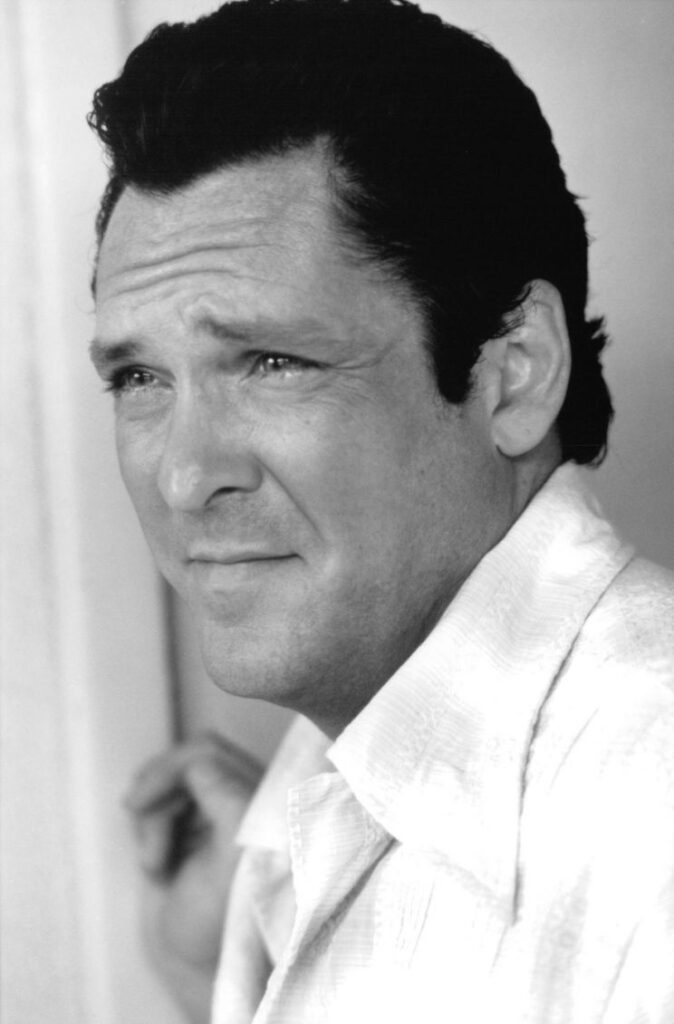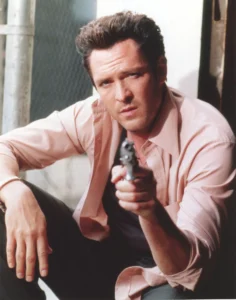

In the silhouette of America’s cinematic highways, where blood and dust often collide, there existed a singular figure who embodied the bruised romanticism and ragged poetry of the American antihero: Michael Madsen. With his sudden passing, an entire generation of film lovers and industry insiders are left to grapple with the loss of an actor who, for decades, defined a raw and often misunderstood strain of masculinity in film. His managers Susan Ferris and Ron Smith, alongside publicist Liz Rodriguez, released a statement that captured the bittersweet moment: “Michael Madsen was one of Hollywood’s most iconic actors, who will be missed by many. […] In the last two years Michael Madsen has been doing some incredible work with independent film including upcoming feature films ‘Resurrection Road,’ ‘Concessions,’ and ‘Cookbook for Southern Housewives,’ and was really looking forward to this next chapter in his life.”
These words ring with an especially heavy resonance. Madsen wasn’t merely an actor; he was a living metaphor for an entire cinematic philosophy — one that prized grit over gloss, soul over spectacle.
The Early Days: A Rebel is Born
Born in Chicago in 1957, Michael Madsen was destined to walk a path less traveled. He grew up in a family that was both creative and tumultuous. His mother, Elaine, was an Emmy-winning filmmaker and poet, and his sister Virginia Madsen would later become a celebrated actress in her own right. Michael’s upbringing was a crucible that forged the raw, deeply emotional performances he would later deliver on screen.
Madsen found his way into acting through the Steppenwolf Theatre Company, a proving ground that emphasized authenticity and emotional vulnerability. From the outset, he was never content with surface-level portrayals; he wanted to reach into the marrow of his characters and expose the fragile bones beneath. This early commitment to craft set the tone for a career that would oscillate between cult classics and mainstream hits.
Hollywood Breakthrough: The Reservoir Dogs Era
For many, Michael Madsen’s definitive moment came with Quentin Tarantino’s 1992 crime thriller Reservoir Dogs. His portrayal of Mr. Blonde — a sadistic yet strangely charismatic criminal — became instantly iconic. The “Stuck in the Middle with You” torture scene has since entered the pantheon of great cinematic moments, cementing Madsen’s place as a master of psychological complexity.
That performance was emblematic of Madsen’s gift: he could take characters who seemed despicable on the page and imbue them with a perverse charm or tragic humanity. It wasn’t just that he played bad men; he revealed the vulnerabilities that lay hidden behind their cruelty.
After Reservoir Dogs, Madsen became a sought-after figure in Hollywood. He collaborated with Tarantino again in Kill Bill: Vol. 1 and Vol. 2, playing Budd, the washed-up, snake-bitten brother of Bill. Even in a universe as stylized and hyperreal as Tarantino’s, Madsen brought an unmistakable authenticity — a sense that these larger-than-life characters had lived long, hard lives before the camera ever started rolling.
The Quintessential Outsider
Michael Madsen’s career never followed the conventional trajectory of an A-list Hollywood star. Instead, he embraced his role as an outsider, a rebel on the fringes. This choice — whether deliberate or circumstantial — became an integral part of his artistic identity.
His filmography is sprawling and eclectic, filled with gritty crime dramas, indie curiosities, and offbeat genre experiments. Films like Donnie Brasco, where he played Sonny Black, showcased his ability to navigate ensemble casts while still commanding attention. Other projects, such as Species, The Getaway, and Sin City, demonstrated his versatility and willingness to take risks.
In many ways, Madsen was a working-class hero in the Hollywood system. He didn’t shy away from low-budget or independent projects; rather, he embraced them as opportunities to explore new facets of his craft. This was especially evident in recent years, as he gravitated toward independent films that allowed him greater creative freedom.
A Prolific Writer: The Poet Behind the Gunslinger
Perhaps lesser known to casual fans is Michael Madsen’s love for poetry and writing. His managers and publicist revealed that he was preparing to release a new book titled Tears For My Father: Outlaw Thoughts and Poems, a deeply personal project that was in the editing stages at the time of his passing.
This revelation sheds light on the contemplative side of Madsen, a man often typecast as the hardened tough guy but who saw himself as a poet at heart. His writing — raw, confessional, and filled with a sense of yearning — mirrors the emotional textures he brought to his performances.
Madsen published several volumes of poetry over the years, including Burning in Paradise and American Badass, which further cemented his reputation as an artist unafraid to bare his soul. Through his poems, readers glimpsed a man wrestling with love, loss, addiction, and redemption. In them, Madsen’s voice is both tender and defiant, echoing the archetype of the American outlaw who is as sensitive as he is dangerous.
The Final Projects: A Creative Renaissance
In the statement from his team, they mention Madsen’s recent involvement with independent films such as Resurrection Road, Concessions, and Cookbook for Southern Housewives. These projects represented a new chapter in his career, one filled with creative possibility and personal rejuvenation.
Resurrection Road promised to be a soulful exploration of redemption and transformation — themes close to Madsen’s heart. Concessions was described as a raw drama set against the backdrop of Americana, while Cookbook for Southern Housewives suggested a quirky, possibly subversive narrative that would have allowed Madsen to flex his comedic and dramatic chops.
Tragically, these films now take on an elegiac quality. They stand as a testament to an artist who, even in his later years, remained hungry to explore, to challenge, and to redefine himself. There is a bittersweet beauty in the fact that Madsen was “really looking forward to this next chapter in his life,” as his team poignantly stated. It underscores the sense of loss not just for the man but for the unrealized possibilities that died with him.
Legacy: An Undeniable Impression
Michael Madsen’s legacy is as multifaceted as his career. To some, he will always be Mr. Blonde, the quintessential Tarantino heavy with a razor-sharp smile. To others, he will be the rough-hewn poet who chronicled the American soul in verse. And to countless colleagues and fans, he was a generous, loyal friend who wore his heart on his sleeve.
His influence can be felt across generations of actors who see in him a model of fearless authenticity. In an industry often obsessed with polish and perfection, Madsen stood as a reminder that the cracks are where the light gets in.
He was the kind of actor who refused to be sanitized or simplified, and in doing so, he captured the complexities of the human condition in a way few others could. Whether he was brandishing a weapon on screen or scribbling lines of poetry in a notebook, Madsen embodied the eternal struggle between chaos and grace.
A Farewell from the Road
As we reflect on Michael Madsen’s life and career, there is an inescapable feeling of unfinished business — a sense that there were still more stories for him to tell, more poems to write, more characters to inhabit. His passing feels like an abrupt cut in a film that was just reaching its emotional crescendo.
Yet perhaps this abruptness is fitting. Like the outlaws and rebels he so often portrayed, Madsen was never meant to fade quietly into the background. His life and art were defined by intensity, by the sudden flare of brilliance in the darkness. In that sense, his departure mirrors the very ethos he embodied: leave them wanting more, leave them wondering, leave them haunted.
The upcoming release of Tears For My Father: Outlaw Thoughts and Poems will serve as a final missive from the man himself — a chance for fans and admirers to connect with his innermost thoughts and feelings. It is both a farewell and an invitation to remember him not just as an actor but as a thinker, a dreamer, and above all, a human being.
Flow
In the coming months, as audiences watch Madsen’s final films and read his last collection of poetry, there will undoubtedly be a surge of renewed appreciation for the depth and breadth of his contributions. Retrospectives will be written, tributes filmed, and social media feeds flooded with iconic stills and memorable quotes. But perhaps the most meaningful tribute will be quieter: the private moments when a fan re-watches Reservoir Dogs or reads a line from his poetry and feels that flicker of recognition — that moment when art makes us feel seen.
Michael Madsen’s life was a tapestry woven from contradictions: toughness and tenderness, violence and vulnerability, destruction and creation. In this, he was profoundly human, and it is this humanity that we will miss the most.
As we say goodbye to Michael Madsen, we do so with gratitude for the roads he traveled and the stories he shared. He was the outlaw poet of American cinema, a man who turned every scar into a verse, every bruise into a ballad. In a world of fleeting fame and hollow spectacle, Madsen was the real thing — and for that, we are all the richer.
Rest in power, Michael. The road is lonelier without you.
No comments yet.








